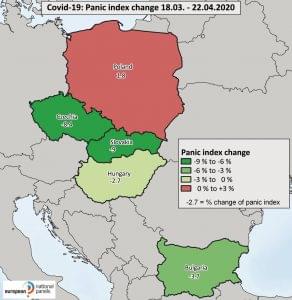People’s perception of the pandemic situation week by week

Attila Seres
client service manager
NMS Hungary
By early March the coronavirus pandemic, which had seemed to be so distant before, turned our world upside down. When the government took the first special measures, NMS Hungary and its international partners (in the Czech Republic, Slovakia, Poland and Bulgaria) launched an online tracking survey called National Pandemic Alarm. This research is monitoring how people feel about the situation. The representative survey has been running on a weekly basis since 17 March. Back in early February NMS Hungary already asked Hungarians about the coronavirus: 97 percent heard about it but 46 percent wasn’t worried at all; 58 percent said if the pandemic reached Hungary, they wouldn’t be affected.

Zsuzsa Kontor
senior researcher
NMS Hungary
Only a month and a half later the panic index – this indicates how afraid people are of the disease – was at 72.5 percent in Hungary, and it peaked at 2 points higher at the end of March. On 22 April the index was at 69.8 percent. 98 percent of respondents said they are actively taking steps to protect themselves from the disease, e.g. washing their hands and using hand sanitiser regularly, avoiding personal contacts, staying at home and wearing a face mask on the street and in shops. More than half of the survey’s participants said their shopping habits had changed significantly, and 71.1 percent are trying to minimise the number of store visits (they don’t only go less often, but also visit fewer shops). In Hungary, the biggest change occurred in the personal experience index: on 18 March 2 percent said they know someone who caught the disease or is affected by it one way or another, but by 22 April this rate jumped to 10 percent.

98 per cent of the respondents made efforts to ward off COVID-19
Rather surprisingly it is the pessimism index that changed the least from the 5 indexes studied (this shows how people feel about the pandemic’s impact on the economy and their workplace). On 22 April the index was at 60 percent, down 1.7 points from the mid-March level. The impact index measures how the pandemic influences our daily lives. It has been growing since mid-March and is currently at 71.4 percent. The majority of people miss meeting friends and family members the most.

Over half of the respondents reported that their shopping habits largely changed over the lockdown
As for the confidence in the state apparatus index – this measures how much citizens trust the government and the authorities – it used to be 54.6 percent in mid-March and by early April the index peaked at 56.5 percent. This was followed by a decline and the index is now at 51.7 percent. It is interesting that the Czech Republic and Slovakia are the most optimistic countries if these five indexes are considered. For instance, the panic index decreased by 8.4-9 percent between the middle of March and the end of April. In most topics, Hungarians had the same opinion as the Polish people.

Learn more about the survey at www.nationalpandemicalarm.eu.
Related news
Bejgli in the basket: exploring Hungarian Christmas traditions
🎧 Hallgasd a cikket: Lejátszás Szünet Folytatás Leállítás Nyelv: Auto…
Read more >What does 2025 hold for the Hungarian population?
🎧 Hallgasd a cikket: Lejátszás Szünet Folytatás Leállítás Nyelv: Auto…
Read more >Related news
How to filter out superficial marketers
🎧 Hallgasd a cikket: Lejátszás Szünet Folytatás Leállítás Nyelv: Auto…
Read more >How to spend Valentine’s Day around here
🎧 Hallgasd a cikket: Lejátszás Szünet Folytatás Leállítás Nyelv: Auto…
Read more >









